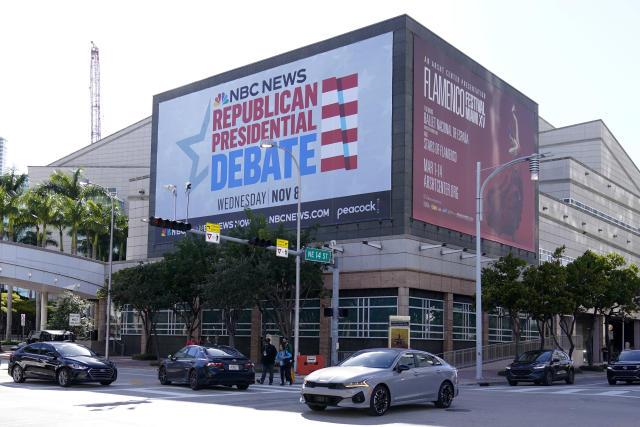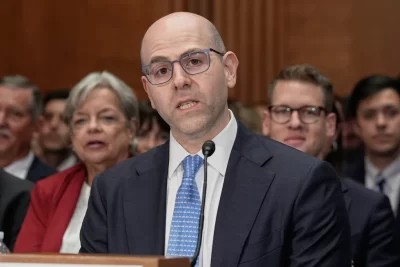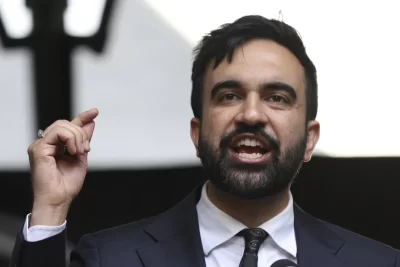
Five Republicans will appear on stage Wednesday night in Miami for the GOP’s third presidential primary debate. The group is the smallest to qualify for the debate stage so far, but it’s unclear whether the increased airtime for the shrinking group will fundamentally change the 2024 Republican presidential nomination fight.
Donald Trump remains the overwhelming front-runner in the race. He has decided to skip this debate, as he has the first two, citing his big polling advantage. Almost exactly one year after he launched his 2024 campaign, a clear Trump alternative has yet to emerge.
Florida Gov. Ron DeSantis, who was expected to fill that role earlier in the year, is stuck in a fierce fight for second place. He’s betting that a strong debate performance — two days after winning the endorsement of Iowa Gov. Kim Reynolds — will help convince a skeptical GOP that he has fully recovered from his early stumbles.
Nikki Haley, the former United Nations ambassador and the only woman in the field, is gaining attention following two strong debates of her own. Another big debate performance could give her a boost over DeSantis.
Don’t discount 38-year-old conservative entrepreneur Vivek Ramaswamy, an eager debater who has played a central role in the first two meetings. And look to Chris Christie, the former New Jersey governor, and South Carolina Sen. Tim Scott to try to stand out in what could be their final chances on the debate stage.
How does Israel fit into the GOP’s ‘America First’ message?
The war between Israel and Hamas had not yet erupted the last time that Republicans met on the debate stage. Even then, foreign policy was a flashpoint as foreign policy hawks like Haley insisted on strong support for Ukraine while DeSantis and Ramaswamy, who lean toward Trump’s America First populism, called for less foreign intervention.
The politics of Israel are different.
Already, DeSantis seems to be aligning himself with Haley and the others who have called for unconditional support for Israel. Ramaswamy might be the only participant who argues for limited U.S. support for Israel, in line with his argument against aid to Ukraine. Polling suggests such a position could be somewhat popular with the Republican base, even if it’s out of step with evangelicals and some in the GOP’s donor class.
It’s easy to see the fight over Israel emerging as a dominant issue — especially with the Republican Jewish Coalition serving as an event co-sponsor.
Can Haley take a big step forward?
Haley is gaining attention in Iowa and New Hampshire, but she has yet to break out as the clear alternative to Trump.
The 51-year-old former South Carolina governor has an opportunity to take a big step forward Wednesday night. Her rivals won’t make it easy, of course.
Given the heightened focus on her candidacy, Haley enters the night with a target on her back in much the same way DeSantis did in the first debate and Ramaswamy did in the second. She hopes to do what her rivals could not when their moments came and went.
Current events would seem to play to her strength.
As a former ambassador to the United Nations, Haley has more foreign policy experience than anyone else on stage. That showed in past debates, especially in clashes against Ramaswamy when the discussion turned to the Russian invasion of Ukraine. But Haley’s preference for a muscular foreign policy could play even better on Israel.
Still, it’s unclear if one issue alone will be enough to convince donors and voters alike that they should coalesce behind her as the clear alternative to Trump. DeSantis, among others, are making much the same pitch.
The longer it takes for Republicans to unite behind a single Trump alternative, the tighter Trump’s grip on the nomination gets.
Is DeSantis entering ‘small hands’ territory?
It’s hard to forget (as much as we’d like to) Marco Rubio’s desperate attempt to take down Trump by insulting his manhood during a 2016 presidential primary debate.
DeSantis may be laying the groundwork to do something similar.
It didn’t end well for Rubio, of course. The Florida senator was forced to suspend his presidential campaign less than two weeks after suggesting Trump had small hands on the debate stage.
Despite Rubio’s downfall, DeSantis in recent days has repeatedly questioned whether Trump has “the balls” to show up to the debate. The Florida governor’s campaign is even selling a set of golf balls as part of the messaging campaign.
It’s all likely little more than a fundraising scheme. But the rhetoric highlights a fundamental dilemma confronting every Trump rival: If multiple felony indictments, an attack on democracy and countless documented lies on issues big and small don’t undermine Trump’s candidacy, what will?
Trump’s competitors have offered half-hearted attacks against him on policy in the first two debates. Most of them also raised their hands to say they’d support him even if he was a convicted criminal. Whatever they’re doing doesn’t seem to be working.
We’ll see if DeSantis tries something different.
Will they help — or hurt — the GOP’s Hispanic outreach?
The Miami location of Wednesday’s debate virtually ensures that the candidates will be pushed on the Republican Party’s strained relationship with Latino voters.
Latino voters have overwhelmingly backed Democrats in recent decades, and they still do, despite anxiety that the growing voting bloc — especially young men — is drifting rightward. The debate participants now have a primetime opportunity to help — or hurt — the GOP’s appeal with Latinos.
All of the Republican candidates are eager to talk about the need to crack down on illegal immigration, especially along the U.S.-Mexico border. They have been far less willing to outline clear plans for those 10-million plus immigrants in the country illegally, which include many children brought into the country by their parents. Some, especially DeSantis, have promoted policies designed to make life in the U.S. difficult for such immigrants.
DeSantis faced a strong backlash from Florida’s immigrant community earlier in the year after signing into law a measure that limits social services for immigrants lacking permanent legal status. Another provision required hospitals that accept Medicaid to include a citizenship question on intake forms, which critics have said is intended to dissuade immigrants living in the U.S. illegally from seeking medical care.
Look for DeSantis and others to be pressed to defend such policies. As the Republican National Committee has acknowledged, tone matters when trying to connect with voters of color.
Last chance for Scott and others?
For some, this could be the final debate appearance.
Scott, in particular, may struggle to meet the Republican National Committee’s fundraising and polling thresholds for the Dec. 6 debate in Alabama, which will require participants to hit 6% in two national polls or a combination of national and early primary state polls. Christie could fail to make the cut as well, while Ramaswamy is teetering at the 6% mark in some polls.
That possibility will create real urgency for the lower-tier candidates to stand out.
Christie and Ramaswamy have a demonstrated a willingness to make a splash when given the opportunity. Scott has been less comfortable with direct confrontation, preferring to stay true to his “happy warrior” profile.
But the prospect of elimination makes any of them a dangerous wild card for the other participants.




